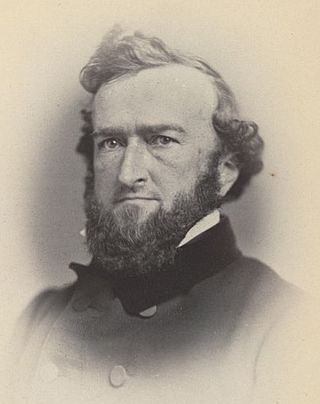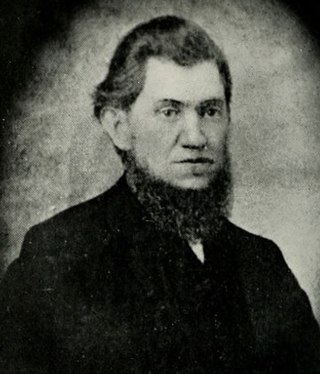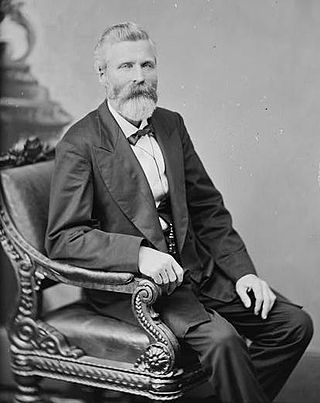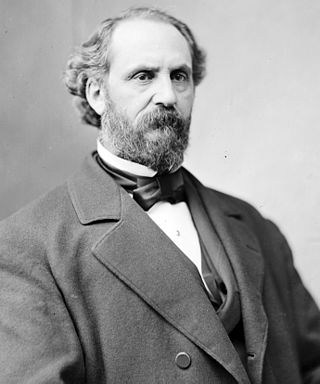
Edward Kimble Valentine was an American Republican Party politician.

Bishop Walden Perkins was a United States representative and Senator from Kansas. Born in Rochester, Ohio, he attended the common schools and Knox College. He prospected for gold through California and New Mexico from 1860 to 1862 and served four years in the Union Army during the Civil War as sergeant, adjutant, and captain. He studied law in Ottawa, Illinois and was admitted to the bar in 1867, commencing the practice of law in Princeton, Indiana. He moved to Oswego, Kansas and continued practice; he was a local county attorney for the Missouri, Kansas & Texas Railroad for two years and prosecuting attorney of Labette County in 1869. He was a judge of the probate court of Labette County from 1870 to 1882, and became editor of the Oswego Register in 1873.

Leonidas Campbell Houk was a lawyer who served in the United States House of Representatives for the 2nd congressional district of Tennessee. Between 1878 and 1891, Houk was elected to seven consecutive terms in the House, during which time he helped solidify the Republican congressional dominance in East Tennessee that remains to the present day. Houk fought for the Union Army during the Civil War, and rose to the rank of colonel within a few months. Largely self-trained as a lawyer, Houk served as a state circuit court judge from 1866 to 1869.

Darwin Scott Hall was an American Republican politician who served one term in the United States House of Representatives, representing Minnesota's 3rd congressional district. He also served in the Minnesota Legislature.

Richard Lee Turberville Beale was a lawyer, three-term United States Congressman from the Commonwealth of Virginia, and a brigadier general in the Confederate States Army during the American Civil War. He had more than 3-dozen slaves and was a Democrat.

Owen Jones was an American lawyer and politician from Pennsylvania who served as a Democratic member of the U.S. House of Representatives for Pennsylvania's 5th congressional district for one term from 1857 to 1859.

Edward Crossland was a Confederate army officer in the American Civil War and later a United States representative from Kentucky. He commanded a brigade of cavalry in the Western Theater and served in several battles.

Frank Lane Wolford was a U.S. Representative from Kentucky.

James Knox Polk Laffoon was a U.S. Representative from Kentucky.

William Ferguson Slemons was a U.S. Representative from Arkansas.

Joseph Champlin Stone was a medical doctor and one-term Republican U.S. Representative from Iowa's 1st congressional district.

James Austin Connolly was an American lawyer, Civil War veteran, and politician who served two terms as a U.S. Representative from Illinois from 1895 to 1899.

John Rice Eden was an American lawyer and politician who a total of five terms served as a U.S. Representative from Illinois during three non-consecutive stints between 1863 and 1887.

William Ralls Morrison was an American politician who served as a U.S. Representative from Illinois.

Henry Blackstone Banning was a lawyer and three-term U.S. Representative from Ohio, as well as an infantry officer in the Union Army during the American Civil War.

Snyder Solomon Kirkpatrick was an American attorney, Civil War veteran and politician who served one term as a U.S. representative from Kansas from 1895 to 1897.

Alfred Briggs Irion was a U. S. Representative for Louisiana's 6th congressional district.

George Colin McKee was a U.S. Representative from Mississippi.

The 3rd Missouri Cavalry Regiment was a cavalry regiment that served in the Union Army during the American Civil War principally in Missouri and Arkansas.
The following list is a Bibliography of American Civil War Union military unit histories. More details on each book are available at WorldCat.



















